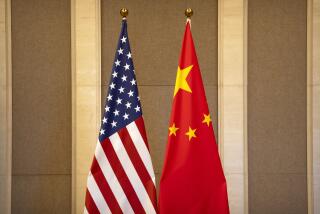China Said to Still Aid Pakistan Missile Plan
- Share via
WASHINGTON — U.S. intelligence reports indicate that China has continued to aid Pakistan’s long-range missile program, people familiar with the information said in recent days.
Over the last week, several members of Congress have been briefed on intelligence findings that China has continued to provide technical expertise to Pakistan. Rather than selling full missile systems to Pakistan, as it has done in the past, China now is providing specialty materials and technical expertise, people familiar with the reports said.
Later this week, John D. Holum, a State Department arms-control official, will travel to Beijing to again express the U.S. government’s concerns. He will be the latest in a parade of State Department officials--including Secretary of State Madeleine Albright--who have visited Beijing this year to ask the Chinese government to restrain itself in sharing missile technology with Pakistan, which the United States fears will exacerbate tensions in South Asia.
“China’s overall record in the nonproliferation area is very good,” a senior Clinton administration official said this weekend. But, he added, “the missile area remains a particular concern, particularly with Pakistan.”
In his meetings in Beijing this week, Holum will seek to impress upon the Chinese that an arms race on the Asian subcontinent is not in Chinese or U.S. interests, the official added.
The evidence of Chinese aid to the Pakistani missile program has been a heated topic of discussion among security experts in Washington in recent days.
“I think there is conclusive evidence of continued assistance on the part of the Chinese to continue the program with materiel and people,” retired Army Col. Larry Wortzel, a former U.S. defense attache in Beijing, said Friday. He said administration officials were resisting that view and demanding a “courtroom-quality” level of evidence against the Chinese.
Wortzel, an Asia analyst at the conservative Heritage Foundation, said he believes the administration is shying away from confronting the intelligence reports’ implications because it wants to avert a diplomatic row.
Relations between Washington and Beijing generally are seen to be warming after a prolonged strain brought on first by the U.S. bombing of the Chinese Embassy in Belgrade during last year’s air war in Kosovo and then by China’s bellicose rhetoric over the status of Taiwan.
China’s aid to Pakistan is in the spotlight because the Senate is expected to consider this month a bill, introduced by Sen. Fred Thompson (R-Tenn.) and co-sponsored by Majority Leader Trent Lott (R-Miss.), that would require the United States to impose stiff penalties on China if “credible evidence” was found that it was helping other nations develop or acquire nuclear bombs and other weapons of mass destruction. Thompson had threatened to add the initiative to legislation granting permanent normal trade relations to China, jeopardizing final passage of the measure.
More to Read
Sign up for Essential California
The most important California stories and recommendations in your inbox every morning.
You may occasionally receive promotional content from the Los Angeles Times.













